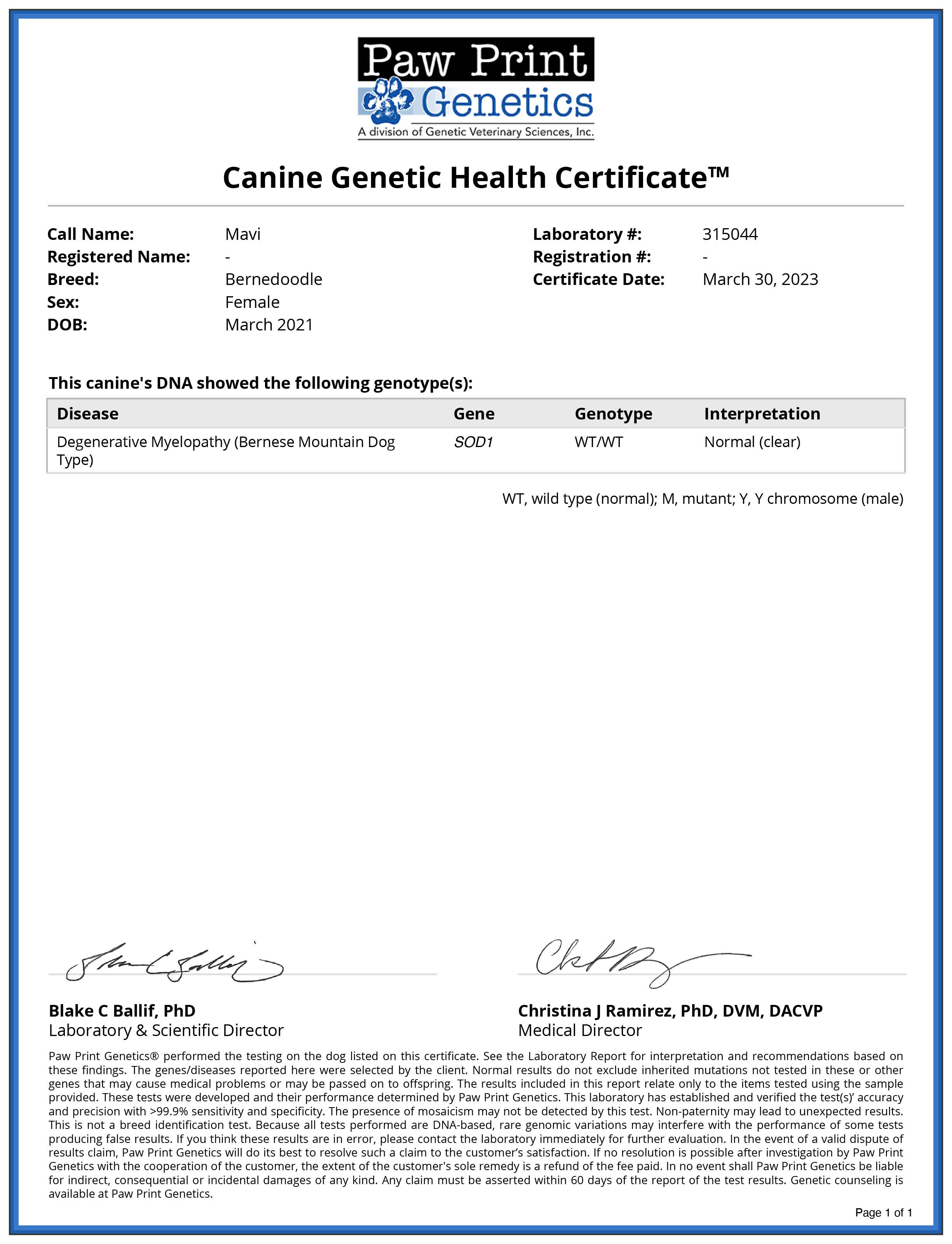Which DNA Tests are Best for Doodles?
Great question! There are several DNA tests that can be beneficial for Doodle breeders. Here are some of the most useful DNA tests that can help you in breeding healthy and high-quality Doodle puppies:
Canine Genetic Health Certificate: This test screens for over 150 genetic health conditions, including those that are common in Doodles such as hip dysplasia, von Willebrand's disease, and progressive retinal atrophy.
Multi-Drug Resistance 1 (MDR1): This test identifies whether a dog carries a gene mutation that can cause drug sensitivities and adverse reactions to certain medications.
Exercise-Induced Collapse (EIC): This test identifies whether a dog carries a gene mutation that can cause muscle weakness and collapse during intense exercise or excitement.
Progressive Retinal Atrophy (PRA): This test identifies whether a dog carries a gene mutation that can cause progressive loss of vision and blindness.
Coat Color and Type: This test identifies the genetic markers responsible for a dog's coat color and type, which can be important in breeding for certain coat types or avoiding certain colors that may be associated with health issues.
Doodles, like all dogs, can be prone to certain health conditions. Here are some of the most common diseases that Doodles may be predisposed to:
Progressive Retinal Atrophy (PRA): This is a group of genetic eye disorders that can lead to progressive vision loss and blindness.
Von Willebrand's Disease: This is a genetic bleeding disorder that can cause excessive bleeding and bruising.
Gastric Dilatation-Volvulus (GDV): This is a life-threatening condition that can occur in large and deep-chested breeds like Doodles, where the stomach twists and traps gas, leading to a bloated stomach, pain, and potential shock.
At Stokeshire, our favorite company to use for DNA testing for our Breeding Team is Embark Vet. We work with them on each and every one of our breeding pairs. This is a little unknown secret. Just email them to get a breakdown of your two possible parents.
Embarkvet is a company that offers comprehensive DNA testing for dogs. They test for a wide range of genetic markers that can reveal important information about a dog's ancestry, health, and traits. Here are some of the DNA tests that Embarkvet offers:
Breed Identification: Embarkvet uses over 350 breeds, types, and varieties in their breed identification algorithm to determine a dog's ancestry.
Genetic Health Risks: Embarkvet tests for over 200 genetic health conditions, including those that are common in specific breeds or mixed-breed dogs.
Drug Sensitivity: This test identifies whether a dog carries a gene mutation that can cause drug sensitivities and adverse reactions to certain medications.
Coat and Physical Traits: This test identifies the genetic markers responsible for a dog's coat color, type, and other physical traits.
Ancestry: Embarkvet can provide a detailed ancestry report that shows a dog's breed makeup, including the percentage of DNA contributed by each breed.
Wolf and Coyote: Embarkvet can also detect wolf and coyote ancestry in dogs, which can be helpful for owners of rescue dogs or those with unknown ancestry.
Animal Genetics is a company that offers DNA testing services for various animals, including dogs. They offer a range of tests that can help dog owners, breeders, and veterinarians to gain important insights into a dog's genetic makeup and health. Here are some of the tests that Animal Genetics offers for dogs:
Coat Color and Type: This test identifies the genetic markers responsible for a dog's coat color and type, which can be important for breeders who want to produce specific coat types or avoid certain colors that may be associated with health issues.
Parentage Testing: This test can confirm the parentage of a dog by comparing their DNA profile to the DNA profiles of their potential parents.
Canine Genetic Health Certificate: This test screens for over 150 genetic health conditions, including those that are common in specific breeds.
Exercise-Induced Collapse (EIC): This test identifies whether a dog carries a gene mutation that can cause muscle weakness and collapse during intense exercise or excitement.
Multi-Drug Resistance 1 (MDR1): This test identifies whether a dog carries a gene mutation that can cause drug sensitivities and adverse reactions to certain medications.
Progressive Retinal Atrophy (PRA): This test identifies whether a dog carries a gene mutation that can cause progressive loss of vision and blindness.
Animal Genetics also offers tests for other animals, including horses, cats, and birds. It's important to note that DNA testing is for informational purposes only and should not be used to diagnose or treat any medical conditions. However, the information provided by DNA testing can be valuable for dog owners, breeders, and veterinarians in understanding a dog's health, traits, and ancestry.
Paw Print Genetics is a company that offers comprehensive DNA testing services for dogs. They provide a range of tests that can help dog owners, breeders, and veterinarians to gain important insights into a dog's genetic makeup and health. Here are some of the tests that Paw Print Genetics offers for dogs:
Breed Identification: This test identifies the breeds present in a dog's ancestry and can help to determine the dog's physical and behavioral traits.
Disease Risk: This test screens for over 150 genetic health conditions, including those that are common in specific breeds or mixed-breed dogs.
Coat Color and Type: This test identifies the genetic markers responsible for a dog's coat color and type, which can be important for breeders who want to produce specific coat types or avoid certain colors that may be associated with health issues.
Eye Health: This test screens for genetic markers associated with eye diseases, including progressive retinal atrophy and cataracts.
Hip and Elbow Dysplasia: These tests screen for genetic markers associated with hip and elbow dysplasia, which can cause arthritis and mobility problems.
Cardiac Health: This test screens for genetic markers associated with cardiac diseases, including dilated cardiomyopathy and arrhythmias.
Multidrug Sensitivity: This test identifies whether a dog carries a gene mutation that can cause drug sensitivities and adverse reactions to certain medications.
Paw Print Genetics also offers tests for other animals, including cats, horses, and birds. It's important to note that DNA testing is for informational purposes only and should not be used to diagnose or treat any medical conditions. However, the information provided by DNA testing can be valuable for dog owners, breeders, and veterinarians in understanding a dog's health, traits, and ancestry.
When selecting the best dog breeder is an important decision that requires careful consideration. Here are some factors to consider when selecting a dog breeder:
Communication: A good breeder will be willing to answer your questions and provide you with information about the breed. They should also be willing to stay in touch after the sale to provide support and answer any questions you may have.
Remember, purchasing a dog from a breeder is a long-term commitment, so take the time to find a responsible breeder who prioritizes the health and welfare of their dogs.
It is important to note that DNA tests alone cannot guarantee the health and quality of a Doodle puppy. However, incorporating genetic testing into your breeding program can help reduce the risk of passing on hereditary health conditions and produce healthier and higher-quality puppies. It is also important to work with a reputable breeder who is knowledgeable about genetic testing and takes steps to ensure the health and well-being of their breeding dogs and puppies.





